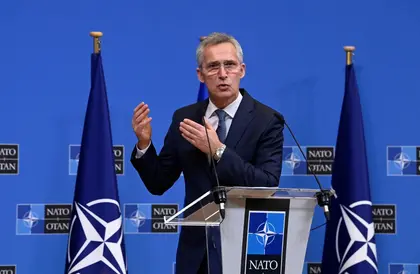The news coming out of Ukraine over the weekend underscored both the devastating scale and the murderous nature of Russia’s ongoing war – at least 35 civilians killed in Dnipro when their apartment block was destroyed by a Russian missile.
Yet there were more positive developments elsewhere as British Prime Minister Rishi Sunak on Saturday pledged to provide 14 Challenger 2 tanks, making it the first Western country to supply the heavy tanks Kyiv has been calling for.
The next day there were further positive signs about the willingness of Ukraine’s Western allies to provide heavy weaponry.
What happened?
Speaking to German media on Sunday, NATO Secretary General Jens Stoltenberg said Ukraine can soon expect more deliveries of heavy weapons from Western countries.
“The recent pledges for heavy warfare equipment are important – and I expect more in the near future,” Stoltenberg told the Handelsblatt daily.
“We are in a decisive phase of the war,” Stoltenberg said. “Therefore, it is important that we provide Ukraine with the weapons it needs to win.”
That sounds positive, did he say anything more precise?
He didn’t, but the timing of the comments is important. They come ahead of a meeting this week of the Ukraine Defence Contact Group, which coordinates arms supplies to Kyiv, at Ramstein Air Base in Germany.
So there could be announcements of more weapons?
It’s difficult to say for certain, but the momentum appears to be in the direction of NATO countries providing weapons that up until very recently had been off the table.

EU Transfers €1.5 Bln Raised From Russian Assets for Ukraine
Why the hesitancy?
Since the beginning of Russia’s reinvasion last year, NATO countries have been keen to avoid providing any weapons that could provoke Russia into a wider conflict beyond the borders of Ukraine.
This has meant weapons deliveries have been reactive to the situation on the ground and have tended to only be defensive and aimed at solving problems Ukraine is already facing.
A good example is the sophisticated Patriot anti-aircraft missile system which was only pledged after Ukrainian cities had been suffering for weeks under mass missile attacks.
Providing heavy tanks marks a shift in this pattern, as they would help Ukraine go on the offensive and, in the words of Sunak, to “push Russian troops back.”
Fourteen tanks doesn’t sound like a lot?
It isn’t and 14 Challenger 2 tanks on their own are not going to win a war, but it’s the shift in direction that’s important.
Earlier this month, France, Germany and the United States respectively promised so-called “light tanks” – an unspecified number of French AMX-10 RC, 40 German Marder, and 50 Bradley fighting vehicles.
Germany in particular had been reluctant to send fighting vehicles, but every time one of the NATO allies pledges a step up in the sort of weapons it is sending, other countries can’t then use the “we might provoke Russia” argument and the pressure on them to follow suit increases.
Has Russia said anything about the tanks?
Of course. Russia’s embassy in Britain warned that “bringing tanks to the conflict zone... will only serve to intensify combat operations, generating more casualties, including among the civilian population.”
This came just hours after a Russian missile destroyed a residential building in Dnipro, killing at least 35 civilians, which highlights what else is on Kyiv’s wish list aside from heavy tanks.
The Ukrainian army said the block was hit by an Kh-22 Russian missile that it lacked the capacity to shoot down.
“Only anti-aircraft missile systems, which in the future may be provided to Ukraine by Western partners... are capable of intercepting these air targets,” it said.
Anything else I need to know about?
Stoltenberg also said that Russian President Vladimir Putin had made a mistake by attacking Ukraine.
“He overestimated the strength of his own armed forces,” the NATO Secretary General added. “We see their missteps, their lack of morale, the leadership problems, the poor equipment.” But the Russians “have demonstrated that they are prepared to take heavy losses to achieve their goals.”
You can also highlight the text and press Ctrl + Enter






